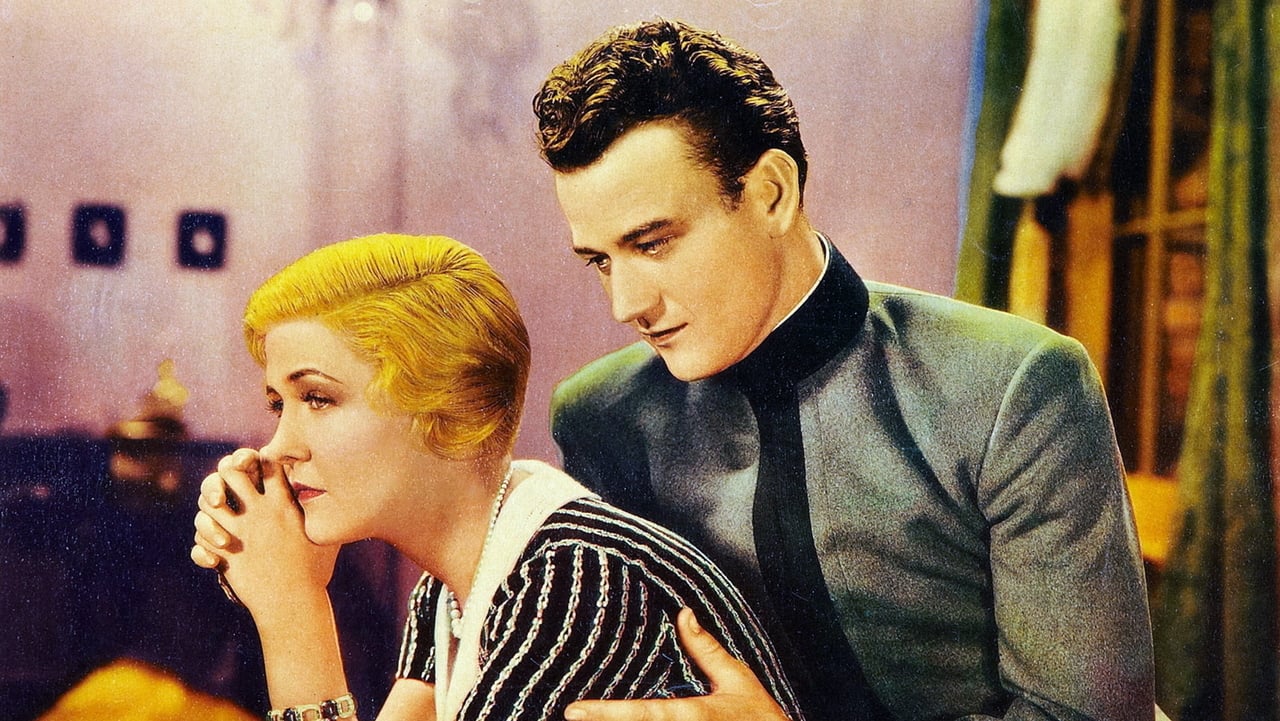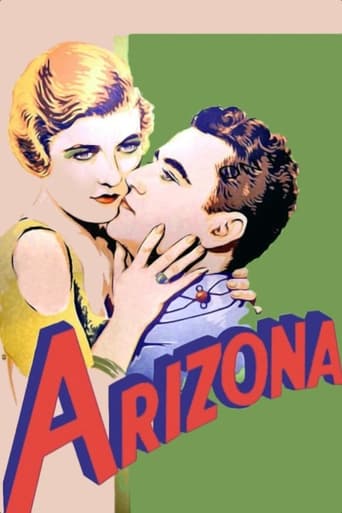


That was an excellent one.
... View MoreEach character in this movie — down to the smallest one — is an individual rather than a type, prone to spontaneous changes of mood and sometimes amusing outbursts of pettiness or ill humor.
... View MoreThe movie really just wants to entertain people.
... View MoreI enjoyed watching this film and would recommend other to give it a try , (as I am) but this movie, although enjoyable to watch due to the better than average acting fails to add anything new to its storyline that is all too familiar to these types of movies.
... View MoreA very young John Wayne is an Army football hero who dumps his non-committed girlfriend (Laura La Plante, the heroine of "The Cat and the Canary" and the original "Show Boat") and takes off for adventures elsewhere. La Plante ends up marrying on the rebound Wayne's former commanding officer (a very good Forrest Stanley) who surprises her by inviting Wayne for a visit. La Plante's naive younger sister (June Clyde) falls for Wayne and a very jealous La Plante plays the devoted overprotective sister to the hilt to keep them from getting involved. Has Wayne changed his womanizing ways? That will be disproven if La Plante and a drunken Mexican senorita (Nina Quartero) get their female way.What starts off fairly slow moves into an entertaining pre-code drama, featuring a fascinating auction scene where La Plante and Stanley try to bid each other out over the football which won the big game, signed by all the players including Wayne. He is present at the start of the auction (with another blonde on his arm), and his look of disgust at La Plante's presence makes it clear that there was another reason for him dumping her rather than just not wanting to commit to her. It's obvious that her feelings for him have remained, and it takes being humiliated through the presence of her younger sister to wake her up. Quartero, playing a stereotypical Mexican spitfire, tries to bring some spark to her scene, but she is certainly no Lupe Velez or even an Armida. Some lavish sets make this appear to be higher budgeted than it probably was, while the direction of George B. Seitz (who later directed some of Judy Garland's early films) speeds up the film once the plot takes off.
... View MoreJohn Wayne is a star football player from West Point and after winning the Army-Navy football game with an extra point, he's off to serve with his mentor, the Colonel, in Arizona. However, before leaving, he gives his girlfriend (Laura La Plante) the brush off--telling her he really wasn't serious about her and would not marry anyone...ever. She was crushed and, oddly, makes the moves on the Colonel. After a short courtship, they marry and they, too, are off to Arizona.Once there, she and Wayne don't tell the Colonel about their prior relationship and Wayne begins dating the lady's younger sister (who, by the way, looks a lot like her). However, it's obvious the old girlfriend carries a grudge and doesn't like her sister hanging around Wayne. Despite earlier in the film saying he didn't want to ever marry, he does fall hard for the sister and they secretly marry.Not knowing her sister and Wayne are married, Ms. La Plante decides to hurt Wayne and get rid of him once and for all--claiming Wayne tried to sexually assault her!!! However, when she finds out that her sister is married, she tries to change her story but still weasel out of the responsibility for lying--saying she had heard from someone that Wayne was a cad so she made up the story. Finally, though, she convinces her decent husband (the Colonel) that Wayne was innocent and her earlier accusation was fabricated and everyone, apparently, lives happier ever after--though this wasn't spelled out clearly. What ALSO wasn't spelled out clearly but I think was strongly implied, by the way, was that Wayne and La Plante's earlier relationship was sexual--adding deeper understanding for why she behaved so vindictively towards him later.This was a pretty lousy film all around and aside from the fact it starred John Wayne, I probably never would have watched it. In his early career that spanned almost an entire decade, Wayne was NOT that popular or famous--appearing mostly in westerns made by studios from "poverty row". The term "poverty row" refers to the incredibly low budgets and low production values many of these tiny studios possessed. Most of these films, quite frankly, are pretty poor and just aren't worth wasting your time on unless you are a die-hard John Wayne fan. I actually do, on rare occasions, like to watch one of his "Three Mesquiteers" of "Singing Sandy" series films--they are fun and mindless and it's also fun seeing Wayne in the most ridiculous situations (such as playing a singing cowboy like Gene Autry). A few of his early films were actually NOT westerns and this is an example of a film made by a not-quite-poverty row studio (Columbia--several years before their glory years and bigger budget films).So why is it so lousy? Well, it isn't all because of the budget, though this didn't help. Much of the film was obviously made inside a sound stage and a lot of stock footage of an Army-Navy football game was recycled. However, what really sunk the film was the amateurish acting and, at times, ridiculous script. No one could act, though one of the worst offenders in this department was John Wayne himself! All the self-assuredness and swagger and energy that you have come to expect from him are gone. Instead, he just seems like a very young and inexperienced actor who could have used more coaching--which is exactly what he was. The positive is that films like this DID help to polish his acting (sort of like putting him in the minor leagues for a few years until he was ready for the big time). The negative is that the film is gosh darn awful--being very silly and sloppily made.
... View MoreMelodramatic soap opera about a young lady named Evelyn (Laura La Plante) who is in love with West Point football hero Bob Denton (John Wayne) - unfortunately for her, he's somewhat of a brash ladies man who says, and these are his very words, "My women understand me - they take one look and know they can expect nothing". Hmmm, well she doesn't seem to understand that and expects to marry him - but he dumps her when he realizes how serious she is about him. So she sets out to get even by actually marrying Bob's boyhood guardian (without Bob's knowledge) and moving to Arizona with the poor older man who is completely clueless about her former relationship. Soon Bob is assigned a post there and stirs things up when he begins a romance with Evelyn's flirtatious sister (June Clyde).This is a very interesting, well done film - okay, I never could understand why women in movies sometimes marry the "wrong man" just to get even or just because they can't get the man they really want. Laura La Plante plays a role here that isn't exactly a very likable person, yet she is such a charming, likable actress herself, her character does manage to come across in an appealing way. John Wayne is okay too (and he doesn't look too bad in his tight-fitting cadet uniform pants, I might add). June Clyde, by the way, gives a very enjoyable performance here playing the cutesy, bubbly flirt to the hilt. A good film, worth seeing.
... View MoreI suppose this is what they used to call a "woman's picture." Laura LaPlante, a fetching, if gnomish blonde, plays Evelyn Palmer, a New York girl (what she does for a living is never revealed) who's been dallying with dashing West Point cadet Bob Denton, played robotically by a very young & handsome John Wayne. When she is dumped unceremoniously before Bob's graduation, Evelyn woos & eventually marries his mentor, Colonel Bonham, played by Forrest Stanley more like a stuffed-shirt British army officer than an American who's spent years in Arizona. The big complication is that, once the newlywed Bonhams relocate to Arizona, Denton shows up for duty &, despite Evelyn's triumphant attitude toward him, Denton takes a fancy to Evelyn's sister, Bonnie, who's the cutest flapper I've seen in ages.This plot, made today, might have a bit more nastiness in that; it's as close to a "Cruel Intentions" as you're going to get in 1931. That Bob & Evelyn are having a sexual relationship is implied, of course, & it's amusing how, later in the picture, every time someone's about to say it, that person is interrupted or hushed. More than that, though I saw this on the Starz Western channel, it's more like your average sophisticated thirties melodrama than a western. The cigarettes are in boxes, gowns are worn to dinner, & the Colonel's house in Arizona is strictly Long Island.The film features some amusing stock footage of an Army-Navy football game, as well as military maneuvers. But without giving anything away, the film unwinds & then winds up in a pretty cliched manner. For John Wayne fans, it's bound to be extremely disappointing, but for those of us who are intrigued by the early days of Hollywood, good & bad, it's not such a bad way to spend an hour. But it was way too silly to be moving, & it's by the numbers mix-up plot never really generates any suspense.
... View More